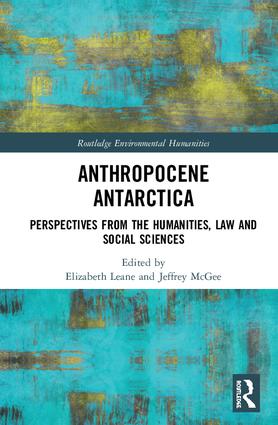 A wide range of research by members of the SCAR Standing Committee on Humanities and Social Sciences (SC-HASS) is featured in a new book, Anthropocene Antarctica: Perspectives from the Humanities, Law and Social Sciences. This collection of essays, published in Routledge’s ‘Environmental Humanities’ series and edited by Prof. Elizabeth Leane and Assoc. Prof. Jeff McGee (University of Tasmania), had its origin in the 2017 SC-HASS biennial conference in Hobart – a number of the chapters are based on papers originally delivered there.
A wide range of research by members of the SCAR Standing Committee on Humanities and Social Sciences (SC-HASS) is featured in a new book, Anthropocene Antarctica: Perspectives from the Humanities, Law and Social Sciences. This collection of essays, published in Routledge’s ‘Environmental Humanities’ series and edited by Prof. Elizabeth Leane and Assoc. Prof. Jeff McGee (University of Tasmania), had its origin in the 2017 SC-HASS biennial conference in Hobart – a number of the chapters are based on papers originally delivered there.
The publisher’s description is as follows:
“Anthropocene Antarctica offers new ways of thinking about the ‘Continent for Science and Peace’ in a time of planetary environmental change. In the Anthropocene, Antarctica has become central to the Earth’s future. Ice cores taken from its interior reveal the deep environmental history of the planet and warming ocean currents are ominously destabilising the glaciers around its edges, presaging sea-level rise in decades and centuries to come. At the same time, proliferating research stations and tourist numbers challenge stereotypes of the continent as the ‘last wilderness.’ The Anthropocene brings Antarctica nearer in thought, entangled with our everyday actions. If the Anthropocene signals the end of the idea of Nature as separate from humans, then the Antarctic, long considered the material embodiment of this idea, faces a radical reframing.”
Understanding the southern polar region in the twenty-first century requires contributions across the disciplinary spectrum. This collection paves the way for researchers in the Environmental Humanities, Law and Social Sciences to engage critically with the Antarctic, fostering a community of scholars who can act with natural scientists to address the globally significant environmental issues that face this vitally important part of the planet.
